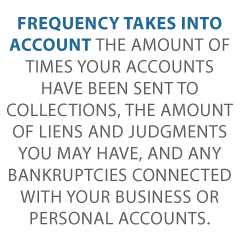Get Some Fast Facts About Your Experian Small Business Credit Score
Experian is one of the large credit reporting agencies. Because they report on both business and person credit, a lot of this post relates to taking care of your personal credit as well. Let’s look at a sample Experian business credit report. And then we can get a handle on the Experian small business credit score.
Experian Small Business Credit Score: Report Sections
Identifying Details
The report divides into sections. The first, as you might expect, contains basic identifying data. So this includes company name and address. But it also includes any ownership information. This section also lists key personnel and the type of business. It also includes how long it has been operating. It also shows the number of employees. And it shows the amount of annual sales.
Payment Information at a Glance
Next is an abridged section with the current days beyond terms. So those are late payments. It also includes predicted days beyond terms.
This section also provides an overall trend. This is along with data points like the lowest and highest balance for the past six months. It also includes the current balance.
By including the highest amount of credit extended, the report shows of the highest credit utilization rate for your company.
This portion also has the number of payment trade lines your business holds. It also shows the number of times any business entity has made an inquiry into your credit history.
It also includes any UCC filings. These are liens on file to support loans. The summary also contains a relative percentage. So this shows the percent of businesses doing worse than yours. It also includes the number of bankruptcies you have. Further, it includes the number of liens and judgments.
Credit Summary
Next is the credit summary This shows your company’s Experian credit score. And it also links to information on what goes into the score. Further, it contains tips on how to improve your score.
Payment Summary
The next part is the payment summary. The portion has line graphs for monthly and quarterly payment trends. And it conveniently shows where the numbers come from. The monthly payment trend is even graphed as against the industry average.
Just below this pair of graphs and supporting data are three bar charts. They show continuous payment trends. So this is a trade line on report for over six months. They also show newly reporting payment trends. So this is a trade line on report for the first time in the last six months. And it shows combined payment trends.
So this is the account balance for those combination trade lines.
Trade Payment Information
The next section is about how your company has done with its payments. So it is broken down into credit card and leasing accounts. It also has trade lines on file for at least six months. And it also has updating activity from the last three months. Another piece is aged trades.
So the last are accounts not updated within the last three months. This information is broken down by supplier category. And it has payment trends at the bottom.
Inquiries
Next up are inquiries into your business’s credit. There is a summary by type of institution doing the asking. The report shows this data by the month when they asked.
Learn business loan secrets and get money for your business.
Inquiries
Next up are inquiries into your business’s credit. There is a summary by kind of institution doing the asking. For example, a bank. And it is by the month when they asked.
Collection Filings
If your business has any collection filings, the listing is here. So the listing is by date, collection agency name, and status. And it is also by amounts disputed and collected. It also includes the closed date, if applicable.
Collections Summary
So this is just below the collection filings section. The summary is fairly self-explanatory.
Commercial Banking, Insurance, Leasing
This portion shows what Experian knows about your company. And it includes its relationships with these types of institutions. The data include what any credit was extended for. It also shows how much credit was extended. And it includes when the loan began. And it shows the remaining balance if applicable.
Judgment Filings
Next the report shows basic legal information. Hence this includes the court where a judgment was filed, and the date. And it shows how much it was for.
Tax Lien Filings
Tax lien filing information is similar to judgment filings. This is except that it lists a filing location, rather than a court.
Learn business loan secrets and get money for your business.
UCC Filings
These filings just show the date and the filing number. They also show the jurisdiction and the name of the secured party. Finally, they also show the activity on the filing.
UCC Filings Summary
Just below that is the UCC filings summary. So it is broken down by filing period and number of certain types of filings. Note: this includes ‘cautionary’.
Score Improvement Tips
Finally, Experian provides a handy list of ways to improve your own, specific report.
But let’s also look directly at Intelliscore Plus as it is a rather specific Experian small business credit score.
What is the Intelliscore Plus Experian Small Business Credit Score?
Quite simply, the Intelliscore Plus credit score is a statistically based credit-risk analysis. The chief function of Intelliscore Plus is to assist businesses, investors and possible future lenders make well educated judgments about who they should or should not do business with.
Just like a car dealership can use a consumer’s FICO score to quickly find out just how much of a risk a potential customer may be, the Intelliscore Plus credit score, which is a mathematical score that varies between 1 and 100, can provide insight on how much of a risk a business or business owner may be.
Intelliscore Plus Credit Score Range
The Intelliscore scores range from 1 to 100, the higher your score, the lower your risk class. On the other hand, the lower your score, the higher your risk class. The chart below lays out each Intelliscore Plus credit score range and its associated meeting.
Score Range Risk Class Description
- 76 – 100 Low
- 51 – 752 Low – Medium
- 26 – 503 Medium
- 11 – 254 High – Medium
- 1 – 105 High
https://creditsuite.wistia.com/medias/07p67s3ai0?embedType=async&videoFoam=true&videoWidth=640
How Is an Intelliscore Plus Experian Small Business Credit Score Calculated?
In the credit world, there are over 800 commercial and owner variables used to establish a Intelliscore Plus credit score. The variables can be broken down into these pivotal factors:
Payment History
Experian calls this recency. But in the real world, it’s nothing more than your current payment status. This includes the number of times your accounts became delinquent, the percent of accounts that are currently delinquent, and your overall trade balance.
Intelliscore Plus is considered to be one of the most reliable tools in effectively predicting risk. One of the ways Intelliscore Plus maintains this claim to fame is by identifying the key factors that indicate whether a business is likely to pay their debt.
Frequency
Closely related to payment history, frequency takes into account the amount of times your accounts have been sent to collections, the amount of liens and judgments you may have, and any bankruptcies connected with your business or personal accounts.
Moreover, frequency can also feature details concerning your payment patterns. Were you regularly slow or late with payment? Did you start off paying bills late, but over time, reduced this behavior? These factors will all be taken into consideration.
Monetary
This particular element focuses on how you employ credit. For example, how much of your available credit is currently being used? Do you have a high ratio of delinquent balance when contrasted with your credit limits?
If you’re about to start a company or are relatively new to this game, the list above may seem a bit overwhelming. If you haven’t started or don’t have a long history of company based transactions, how will Intelliscore Plus rate you?
Intelliscore Plus addresses these situations by utilizing a ‘blended model’ to establish your score. This means that they take your personal consumer credit score into consideration when ascertaining your business’s credit score.
Learn business loan secrets and get money for your business.
How Do You Improve Your Intelliscore Plus Experian Small Business Credit Score?
The big question has arrived. And while there is no golden answer, these ideas can definitely help you boost your score:
Make Your Payments on Time
As we just discussed, your payment patterns and history are a driving force in your overall credit score. Overtime, paying your bills punctually will help establish your firm as one that pays their debts. This will undoubtedly help push your score up and show other businesses that you are a low risk. There is nothing you can do which is more vital to raising your Experian small business credit score than this.
Use Your Credit
Keeping your debts low remains solid advice. But opening and responsibly taking advantage of business credit accounts can help you expand your available credit. This helps you raise your Experian small business credit score.
Maintain a Healthy Personal Credit Profile to Help Raise Your Experian Small Business Credit Score
By now, you’re aware that your own personal credit is fair game when it comes to your Intelliscore Plus score. Managing a business is difficult work. But don’t let your personal finances pay the price. See to it that you stay on top of your personal monthly bills, stay clear of unnecessary credit inquiries. And don’t sacrifice your personal credit for business demands.
Examine Your Credit Reports
Irrespective of what your credit score is, it is crucial that you remain diligent. Review your personal and business credit reports. This can help you detect possible issues and stay educated on your own credit profile. We can help you monitor business credit at Experian and D&B for 90% less than it would cost you at the CRAs. See: www.creditsuite.com/monitoring.
Update the details if there are inaccuracies or the data is incomplete. For Experian, go here: www.experian.com/small-business/business-credit-information.
Fix Your Business Credit to Raise Your Experian Small Business Credit Score
So, what’s all this monitoring for? It’s to dispute any inaccuracies in your records. You can correct mistakes in your credit report. But CRAs normally want you to dispute in a particular way.
Get your Experian report at: www.businesscreditfacts.com/pdp.aspx?pg=SearchForm.
Disputes
Disputing credit report mistakes normally means you precisely itemize any charges you contest.
You can dispute errors on your or your business’s Experian report by following the instructions here: www.experian.com/small-business/business-credit-information.
Raising Your Experian Small Business Credit Score
Beyond anything else, improving your payment history will increase your Experian small business credit score.
Keep your credit utilization within reason. So this is because less than 30% of your total available credit is best. Clear your debts as fast as possible. And don’t go delinquent. Also, avoid any late payments. Then, you should be able to improve your Experian small business credit score over time.

